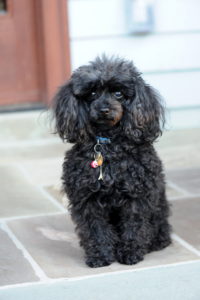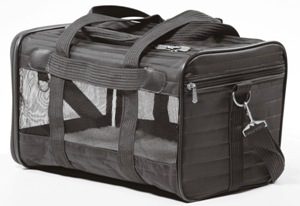I have a 13-week-old puppy on my hands. In people years, Rocky is approximately a year and 8 months — a toddler approaching the terrible twos.
Drop by anytime, and you’ll see a little black-and-white fluffball “barcuuming” my living room. He picks up dust bunnies and random bits of paper, tugs at wires, and teethes on everything from my house keys to the rattan base of the coffee table.
BARCUUM (bar’ kyoom ) v. To use the family dog to remove crumbs that have dropped to the floor under the kitchen table. “Will Rover or Spot do the barcuuming after supper tonight?”

He’s also an escape artist! The third day I had him, I decided to leave him alone, confident that he was safe in the same kind of “playpen” I’d used with Bogey, my dear departed black toy poodle. I came home to find Rocky lounging in the living room. The playpen was still locked.
An hour later, I put him back into the playpen, acted as if I was leaving the room but secretly continued to observe (and video) his second attempt to escape. That time, he didn’t make it. His middle name is now “Houdini.”
I decided to apply the principles of “baby-whispering.”
They tell writers to write what they know. But the reverse is true as well: We also learn what we write.
When my coauthor, the late Tracy Hogg, and I worked on our first book, Secrets of the Baby Whisperer, she often compared babies to puppies. “They’re both sensate creatures,” she said. “They can’t tell us what they need or want, so we need to figure it out.”
This is how:
Slow down and tune in. I spent the first week just watching Rocky — how he ate, how he played with his toys, whether noises startled him, how he greeted unfamiliar humans and dogs, how he behaved right before he peed or pooped. By observing carefully, I began to understand his temperament and his habits.
Provide a predictable routine. “You’re following the baby? What does he know?” Tracy would ask every sleep-deprived mother who fed her newborn whenever it cried or “looked” hungry. Poor mom, poor baby! No two days would be the same. To add structure and predictability to our lives, I put Rocky on the “EASY” routine — Eat, Activity, Sleep, and time for You (me) — .
After Rocky’s breakfast (the E), he plays (the A). I join in some of the time, but I also make sure he learns to amuse himself. (Fostering independence is another key tenet of baby whispering.) An hour later, I usually corral him into his playpen for a nap (the S), so have time for writing (the Y). We repeat EASY four times a day.
Schedule “rehearsals for change.” Our book about toddlers urged parents to prepare young children for their many “firsts.” For example, you take a two-year-old for a bagel at a coffee shop before dining at a restaurant and where he’ll have to sit through a full meal.  Because of my itinerant lifestyle, Rocky and I are already starting “rehearsals” for travel. I put him in his Sherpa bag, and he joins me on errands and walks. This weekend, he’ll have his first car ride. We’re working up to his first plane trip in December.
Because of my itinerant lifestyle, Rocky and I are already starting “rehearsals” for travel. I put him in his Sherpa bag, and he joins me on errands and walks. This weekend, he’ll have his first car ride. We’re working up to his first plane trip in December.
Reward good behavior – and turn your back on tantrums. I try to catch Rocky — and praise him — when he’s doing something I want him to do. I ignore behaviors I don’t want to reinforce. When he whines to get out of his playpen, I don’t even look at him. A few minutes later, I open the door as if it’s my idea to let him out. I’ve gotten better, too, at saying “sit” once and waiting until he responds. Otherwise, Rocky is teaching me how to repeat the word sit! (Patience is a key tenet of baby-whispering, too!)
Beware of “accidental parenting.” Tracy always said, “Start as you mean to go on.” Oops! On Rocky’s first day, I thought it “cute” when he untied my shoelaces. Unthinkingly, I retied them and let him untie them again. I even made a video of him doing it. That little bit of accidental parenting has already cost me a pair of shoelaces and, worse, Rocky now thinks my foot is a chew toy.
Don’t feel guilty. I wanted to kick myself for encouraging Rocky to “attack” my sneakers. Shouldn’t I have known better? But I remembered that in each of our books, we referred to guilt as a no-win emotion. It drains you and does nothing for your child — or puppy. Besides, it’s “perfect madness,” to borrow from the title of Judith Warner’s 2005 book, to think that I won’t make any mistakes!
Instead, I’ll try to focus on how much joy this tiny bundle of energy has already brought into my life — and how lucky we both are!
Good insights. I look forward to learning more about this new relationship.
You will!
Can’t wait to see how much Rocky continues to grow. He’s truly an amazing pup! I agree, don’t stress over the mistakes. Training puppies are a trial and error type of thing. You’re doing fantastic ❤️.
Thank you, Rocky’s “godmother” and my guardian angel!